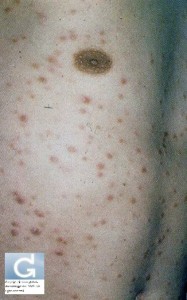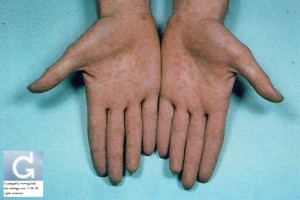Syphilis
What is syphilis?
- It is a sexually transmitted infection caused by a bacteria called treponema pallidum.
How do I catch it?
- Non-protected sexual intercourse with an infected individual (oral, vaginal, anal)
- Mother-to-child transmission (transplacental infection)
- Contaminated blood transfusion
- Sharing of contaminated needles (while injecting drugs with an infected individual…)
What are the stages of syphilis?
Syphilis is divided into the following stages:
- (A): Primary syphilis
- Occurs 9 to 90 days following the infection.
- Presents as a painless ulcerations (called chancre) located on the penis, vulva or cervix (of the uterus).
- (B): Secondary syphilis
- Occurs a few weeks to two years after the primary stage of syphilis.
- Presents as a painless skin rash, often located on the palms and soles.
- Lymph node enlargement
- Wart-like growths in the genital and anal areas (“condyloma lata”)
- Other signs include hair loss, ulcers in the mouth, inflammation of the brain and liver.
- (C): Latent syphilis
- No symptoms nor signs are present but internal organs may continue to be affected by the disease process.
- Early latent syphilis: less than one year after the infection.
- Late latent syphilis: more than one year after the infection.
- (D): Tertiary syphilis
- Occurs between 5 and 30 years after secondary syphilis.
- Is characterized by irreversible damage such as the brain (mental illness), blood vessels and the heart (heart failure), nerves and the spina cord (sensitivity disorders and/or paralysis).
- (E): Congenital syphilis
- Bone deformity
- Loss of vision
- Deafness
- Face deformity
- Teeth deformity
- Skin rashes
- Neonatal death
How is syphilis diagnosed?
- Positive screening blood tests (4 to 6 weeks after exposure) called VDRL (venereal disease research laboratory) or RPR (rapid plasma reagin).
- A positive screening test must be confirmed by a positive TPPA (Treponema-Pallidum-Hemagglutinations-Assay) or the demonstration of antibodies.
- Secretions of a chancre of skin lesions can be examined with a microscope (dark field) to detect the organism.
How is syphilis treated?
- The injection of penicillin is the best treatment.
- Oral antibiotics are available for patients allergic to penicillin.
- In primary, secondary and latent syphilis, a well done treatment enables a complete cure.
- In tertiary and congenital syphilis, the treatment can stop the progression of the disease but cannot always restore normal function, nor reverse permanent damage.
What must I do?
- See a medical doctor now if you think you mighht be infected.
- Inform your doctor of all drug allergies.
- Do not engage in sexual intercourse as long as the treatment has not been completed.
- Follow the advice of the doctor, most notably for the need to do multiple blood tests to guaranty a full cure.
- Do not donate your blood.
- Ensure that you sexual partners also comme for screening that they can be treated if an infection is present.
- It is possible to be reinfected, because no immunity is gained from a first infection.
Important
- Early detection and treatment ensure a complete cure.
- Remember to inform your doctor if you have already previously been treated for syphilis.
- Always adopt a “safer sex attitude” (see below) with prostitutes and casual acquaintances.
What does “safer sex attitude” mean?
- It is a sexual intercourse with no contact between the secretion fluids (vaginal secretions, sperm).
- Use condoms (male or female available) for each sexual intercourse.
- Do not consume alcohol before or during the sex act as it could impair your judgement.
Contributors
Dr Husain Ali Mahdi Juma (دكتورحسين علي جمعه) – dermatologist. Manama, Bahrain
National Skin Centre. Singapore
Category : syphilis - Modifie le 03.14.2010






